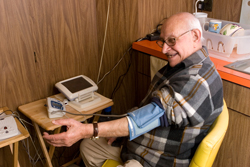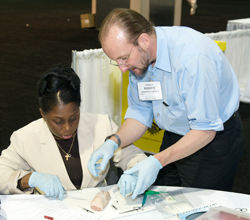An internist makes the leap to practice hospital medicine
Internist Peter Nock, ACP Member, describes how the immediacy of treating hospitalized patients prompted him to leave his office-based practice.
Peter Nock, ACP Member
Occupation: Hospitalist at Licking Memorial Hospital in Newark, Ohio.

Age: 48.
Current residence: Granville, Ohio.
Hometown: Syracuse, N.Y.
Family: Married with three children.
Medical school: Michigan State University College of Osteopathic Medicine.
Residency: Internal medicine at Michigan State University College of Human Medicine, and Sparrow Hospital in Lansing, Mich.
Specialty: Internal medicine.
Something I wish I'd learned in medical school: I wish I'd learned about the business of medicine, and about money and finances. Those are things I've had to learn along the way.
First job: I was an associate professor at Michigan State University College of Osteopathic Medicine in internal medicine, and then I went into private practice for two and a half years in Lansing.
My experience of private practice: The majority of my training was in inpatient medicine. I just wasn't meant to do the office practice, nine-to-five type of medicine. With patients in the hospital, they are sick and there is something you can identify and remedy in a short period of time. With outpatient medicine, there are a lot of chronic problems. If someone has pneumonia, you can treat and fix it, whereas with something like chronic back pain, I don't see myself as having as great an impact.
I became a hospitalist because: In 1999 or 2000, John Nelson came to Sparrow Hospital—the hospitalist movement was very young at that time—and he was discussing hospital medicine. He was very enthusiastic and passionate about how hospital medicine was going to evolve, and I think some of it rubbed off on me.
Most rewarding aspect of your job: When I see someone I've taken care of after they have left the hospital and they say, “Thank you. You did a really good job. I was really sick.” I often won't know the person because I saw them while they were in the hospital and they looked sick, but it's very gratifying.
Most meaningful professional accomplishment: Winning the Physician of the Year award (at Licking Memorial Hospital) in 2007 was very meaningful and rewarding for me. I was also in the inaugural class of fellows of the Society of Hospital Medicine last May, and I was pretty pleased with that, as well.
Future goals: I'd like to become certified in palliative and hospice medicine. I hope to take the test this year.
Hardest medical lesson learned: To not be arrogant. Our arrogance sometimes closes our minds. We may get an idea about what is going on with a patient and stick to that, and not entertain any other possibilities as to what is going on. In that instance, arrogance isn't only bad for us, it's bad for our patient.
Personal heroes: I really don't have any individual heroes. I look at people like Abe Lincoln and I admire him for his tenacity and resilience and intellect.
Favorite quote: It's from Maya Angelou: “I have learned that people will forget what you said, people will forget what you did, but people will never forget how you made them feel.”
Pet peeves: Hospital gossip, reality TV, and people sitting while others are working hard around them.
Favorite ways to spend free time: I love to spend time with my family, traveling with my family, riding my bike, exercising and reading.
Book on your nightstand: “The Express” about Ernie Davis by Robert Gallagher.
Most meaningful non-medical accomplishment: I helped raise with my wife three pretty nice kids.
Item I can't live without: My stethoscope.
If I weren't a physician, I would be: A lawyer defending physicians, because I've been there and I really appreciated my lawyer.





